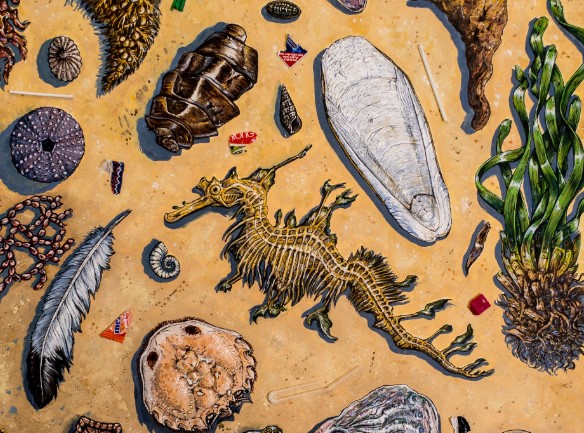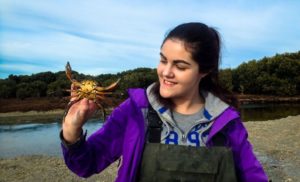
From invasive species to coastal erosion, local high school students will even be able to ‘find Nemo’ when they visit Flinders University this week.
They will visit Flinders University’s main Bedford Park campus on 19 July as part of the Coastal Ambassadors Youth Training program funded by the Adelaide and Mount Lofty Ranges Natural Resources Management Board (AMLR NRM Board).
Students from across the region – from the metropolitan area through to the Barossa and Victor Harbor – will hear from a range of experts, including Ryan Baring and René Campbell from the Flinders Ecosystem Ecology Lab.
Marine ecology PhD candidate René Campbell, who is also a visual artist is assessing the population biology of the invasive European shore crab (Carcinus spp.) in southern Australia.
Her project will help identify how some biological traits, such as reproduction, population genetics and morphology, can influence invasion success.
She will present to the Young Coastal Ambassadors on how marine research is helping to monitor and understand invasive European shore crabs.
With 12 honours and PhD students, Dr Baring is assessing marine park conservation measures and other ways to restore and improve habitats, including using plants (such as grass-like sedges) and animals (such as oysters and clams) as water filters for wetlands and coastal waters.
“For example, at Port Gawler, we have started engaging with community groups for citizen science monitoring of important mudflats for foraging grounds by migratory shorebirds,” says lecturer and research leader Dr Baring, who is also SA branch president of the Australian Marine Sciences Association.
“The migratory shorebirds coming from the northern hemisphere each year include stints and sandpipers, and are under stress in the Adelaide metropolitan area,” says Dr Baring.

Both Dr Baring’s and Ms Campbell’s research projects are funded by the AMLR NMR board, via the Coastal Ambassador program.
“We need to understand our coastal ecology in Australia to help prevent and reduce the threats to and impact upon our precious marine life,” says marine biologist Ryan Baring, from the Ecosystem Ecology Lab in the College of Science and Engineering.
Professor Patrick Hesp, from Environmental Sciences, will give a talk on the effects of storms and erosion on sand dunes, while University student ambassadors will take the high school visitors on an interactive marine biology workshop discussing what sea creatures and ecosystems are common near South Australia’s jetties.
Playford Trust scholarship holder and PhD Candidate Andrea Bertram will discuss her studies in DNA to help conserve native fish – and even show how marine scientists can find out the age of a fish from the inner ear otolith ‘bone’ – while clownfish bred in captivity at the Flinders Animal House will showcase the University’s world-leading Saving Nemo program.
Shark expert Associate Professor Charlie Huveneers and postgraduate researcher Sasha Whitmarsh will talk on the ‘awesome world of sharks’.
For more info about Youth Coastal Ambassadors please see https://www.naturalresources.sa.gov.au/adelaidemtloftyranges/get-involved/volunteering/volunteer-opportunities/coastal-youth-champions

